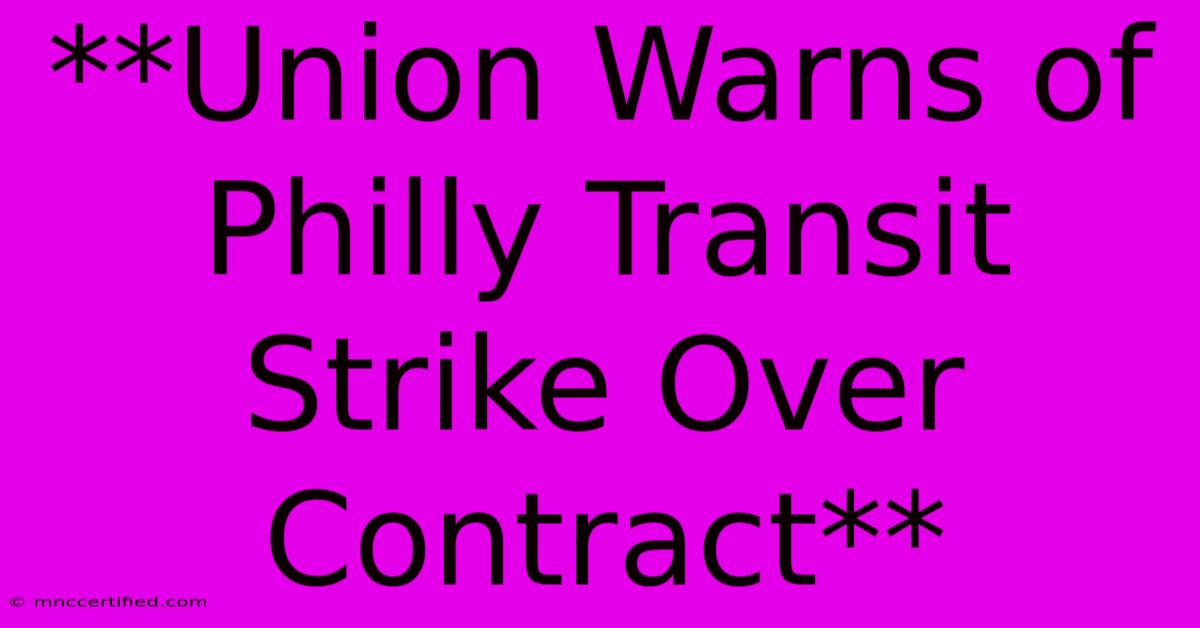**Union Warns Of Philly Transit Strike Over Contract**

Table of Contents
Union Warns of Philly Transit Strike Over Contract: What You Need to Know
The threat of a Philadelphia transit strike looms large as negotiations between the Transport Workers Union (TWU) Local 234 and the Southeastern Pennsylvania Transportation Authority (SEPTA) have reached an impasse. The union, representing over 5,000 SEPTA workers, has issued a strike warning, potentially disrupting the lives of millions who rely on the city's public transportation system. This article delves into the key issues at the heart of the dispute, the potential impact of a strike, and what riders can expect in the days ahead.
The Core Issues in the Contract Dispute
The primary points of contention between the union and SEPTA center around wages, benefits, and work conditions. The TWU is seeking significant increases in pay, improvements to health insurance coverage, and protections against excessive overtime. SEPTA, facing budget constraints, argues that the union's demands are unsustainable and would necessitate substantial service cuts.
Here's a breakdown of the key demands:
- Wages: The union is seeking substantial wage increases to match rising inflation and keep pace with comparable transit workers in other major cities.
- Benefits: The TWU wants improvements to healthcare coverage, including lower deductibles and co-pays, as well as enhanced retirement benefits.
- Work Conditions: The union seeks to address concerns about excessive overtime, staffing shortages, and workplace safety.
Potential Impact of a Philly Transit Strike
A strike would cripple Philadelphia's public transportation system, affecting millions of commuters, students, and visitors. Here's a possible breakdown of the potential impact:
- Disruption to Commuting: The strike would force commuters to find alternative transportation options, leading to increased traffic congestion, parking shortages, and longer travel times.
- Economic Impact: Businesses and industries reliant on public transportation would face significant disruptions, potentially leading to lost revenue and productivity.
- School and University Impacts: Students and faculty relying on SEPTA to reach educational institutions would face major challenges, potentially affecting attendance and operations.
- Tourism and Visitor Impact: Tourists and visitors would be greatly impacted, with limited access to major attractions and destinations.
What Riders Can Expect in the Coming Days
The situation remains fluid, with both sides continuing to negotiate. Here's what riders can expect:
- Negotiations: The union and SEPTA are scheduled to resume negotiations in the coming days.
- Strike Deadline: The TWU has not yet officially declared a strike date, but they have warned of potential action if a contract agreement is not reached soon.
- Information Updates: SEPTA is committed to providing riders with timely information regarding any developments through its website, social media channels, and official announcements.
It's crucial for riders to stay informed and prepare for potential disruptions to their commutes. Consider exploring alternative transportation options and plan accordingly to minimize inconvenience.
The Importance of Public Transportation
This labor dispute highlights the crucial role public transportation plays in the lives of millions of Philadelphians. The strike underscores the need for fair and equitable working conditions for transit workers, while also emphasizing the essential service they provide to the community.
It remains to be seen whether the union and SEPTA will reach a compromise before a strike occurs. The coming days will be critical for the future of Philadelphia's transit system and the well-being of its commuters.

Thank you for visiting our website wich cover about **Union Warns Of Philly Transit Strike Over Contract**. We hope the information provided has been useful to you. Feel free to contact us if you have any questions or need further assistance. See you next time and dont miss to bookmark.
Featured Posts
-
Galatasaray Vs Tottenham Live Uefa Match Updates
Nov 08, 2024
-
Eddie Redmayne Beyond The Familiar
Nov 08, 2024
-
Ps 5 Pro Review Best Games For Enhanced Performance
Nov 08, 2024
-
Watch Chelsea Scores 4 Goals In 20 Minutes
Nov 08, 2024
-
Insurance Claim Without A Police Report
Nov 08, 2024